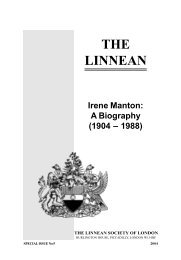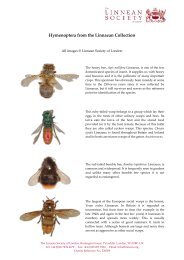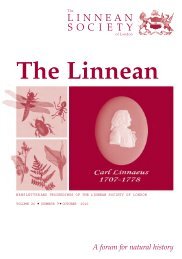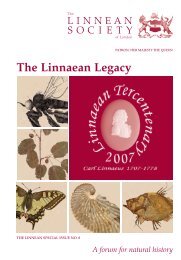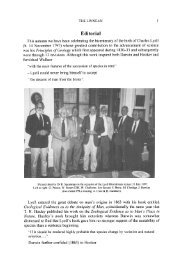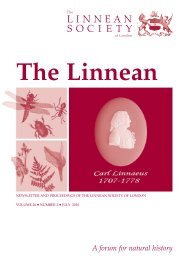Vol 25, no 3, October - The Linnean Society of London
Vol 25, no 3, October - The Linnean Society of London
Vol 25, no 3, October - The Linnean Society of London
Create successful ePaper yourself
Turn your PDF publications into a flip-book with our unique Google optimized e-Paper software.
14<br />
THE LINNEAN 2009 VOLUME <strong>25</strong>(3)<br />
But it is at the point where Darwin describes their language as ‘inarticulate’ that<br />
he displays pure bigotry, even though he qualifies his words with the phrase ‘according<br />
to our <strong>no</strong>tions’. ‘No European ever cleared his throat with so many hoarse, gutteral,<br />
and clicking sounds.’ Now would the man who discovered the theory <strong>of</strong> evolution<br />
compare the wings <strong>of</strong> one species <strong>of</strong> finch on the Galapagos Islands with a<strong>no</strong>ther in<br />
the way he here compares a Fuegian language with a European one? He would surely<br />
<strong>no</strong>t compare the morphological adaptations <strong>of</strong> two different finch species in a way<br />
that was derogatory to one and praising <strong>of</strong> the other, inasmuch as they differed. He<br />
would <strong>no</strong>t take one as a desirable <strong>no</strong>rm, the other as deficient in some way.<br />
“<strong>The</strong>y are excellent mimics: as <strong>of</strong>ten as we coughed or yawned, or made any odd motion,<br />
they immediately imitated us. Some <strong>of</strong> our party began to squint and look awry; but one<br />
<strong>of</strong> the young Fuegians (whose whole face was painted black, excepting a white band<br />
across his eyes) succeeded in making far more hideous grimaces. <strong>The</strong>y could repeat<br />
with perfect correctness, each word in any sentence we addressed them, and they<br />
remembered such words for some time. Yet we Europeans all k<strong>no</strong>w how difficult it is to<br />
distinguish apart the sounds in a foreign language. Which <strong>of</strong> us, for instance, could<br />
follow an American Indian through a sentence <strong>of</strong> more than three words? All savages<br />
appear to possess, to an uncommon degree, this power <strong>of</strong> mimicry. I was told almost in<br />
the same words, <strong>of</strong> the same ludicrous habits among the Caffres: the Australians, likewise,<br />
have long been <strong>no</strong>torious for being able to imitate and describe the gait <strong>of</strong> any man, so<br />
that he may be recognized. How can this faculty be explained? Is it a consequence <strong>of</strong> the<br />
more practised habits <strong>of</strong> perception and keener senses, common to all men in a savage<br />
state, as compared to those long civilized?”<br />
Darwin here admires the ability <strong>of</strong> these Haush to mimic his and his companions’<br />
gestures, sounds, and words. He admits they are better at this than ‘we Europeans’,<br />
and even commences, for a moment, to enter into a scientific speculation into the<br />
reasons for this. Yet he describes this facility as a ‘ludicrous habit’.<br />
“When a song was struck up by our party, I thought the Fuegians would have fallen<br />
down with astonishment. With equal surprise they viewed our dancing; but one <strong>of</strong> the<br />
young men, when asked, had <strong>no</strong> objection to a little waltzing. Little accustomed to<br />
Europeans as they appeared to be, yet they knew, and dreaded our fire-arms; <strong>no</strong>thing<br />
would tempt them to take a gun in their hands. <strong>The</strong>y begged for knives, calling them by<br />
the Spanish word ‘cuchilla’. <strong>The</strong>y explained also what they wanted, by acting as if they<br />
had a piece <strong>of</strong> blubber in their mouth, and then pretending to cut instead <strong>of</strong> tear it.”<br />
Here again, Darwin observes and apparently admires these Indians’ interest in,<br />
and openness to entering into his and his colleagues’ way <strong>of</strong> dancing. He observes<br />
their sensible reluctance to play around with fire-arms. And he shows how well they<br />
k<strong>no</strong>w which piece <strong>of</strong> European tech<strong>no</strong>logy they want, the knife, and how they can<br />
communicate very well both their desire for this and the use to which they will put it.<br />
“It was interesting to watch the conduct <strong>of</strong> these people towards Jemmy Button (one <strong>of</strong><br />
the Fuegians who had been taken, during the former voyage, to England. Captain Fitzroy<br />
has given a history <strong>of</strong> these people. Four were taken to England; one died there, and the<br />
three others – two men and one woman – were <strong>no</strong>w brought back and settled in their<br />
own country): they immediately perceived the difference between him and the rest, and<br />
held much conversation between themselves on the subject. <strong>The</strong> old man addressed a<br />
long harangue to Jemmy, which it seems was to invite him to stay with them. But Jemmy<br />
understood very little <strong>of</strong> their language, and was, moreover, thoroughly ashamed <strong>of</strong> his



